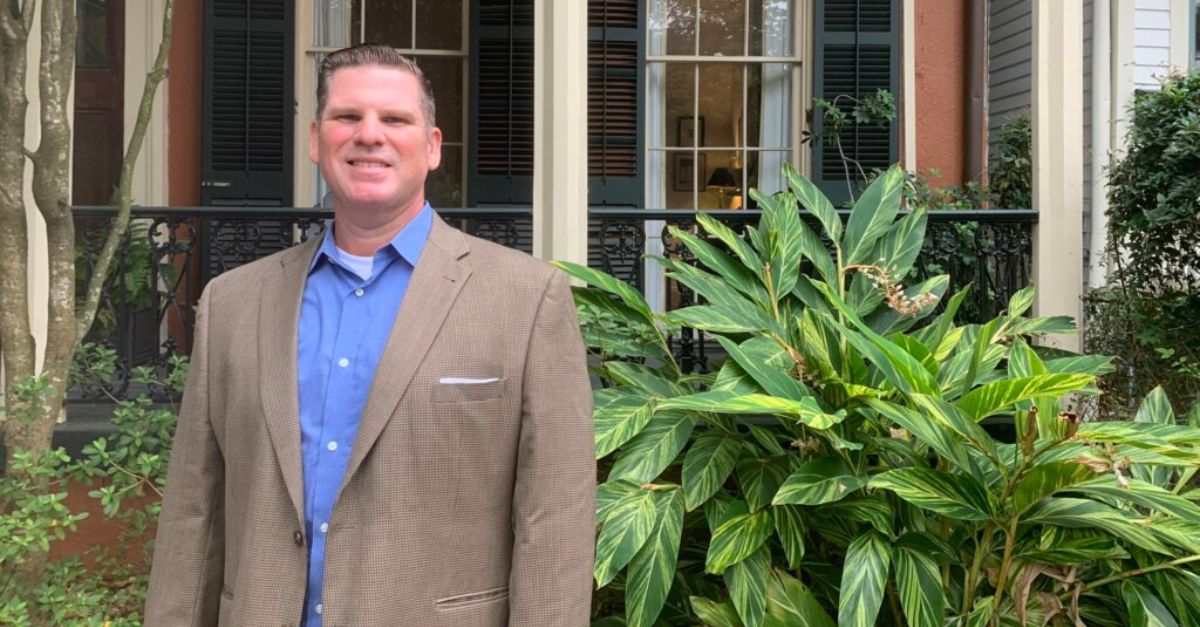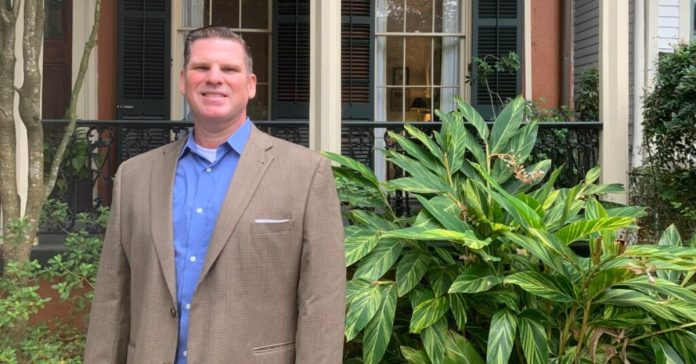
Attorney Randy Boudreaux sued the Louisiana State Bar Association, claiming that various social media posts by the organization violated his First Amendment rights. (Photo courtesy of The Pelican Institute).
A gay conservative lawyer who once fought for inclusive representation within the Republican party scored a win in his lawsuit against a state bar association over its tweets of a Pride Flag and wellness tips for lawyers.
Randy Boudreaux is a licensed attorney in Louisiana, a state that requires all attorneys to be members of the state bar association at a cost of $80 to $200 in mandatory annual dues. Boudreaux waged a legal battle against the Louisiana State Bar Association (LSBA) in which he argued that the group’s social media posts constituted compelled speech in violation of his First Amendment rights.
Boudreaux’s complaint raised objections to 17 separate tweets by the bar association. Some related to the group’s “Wellness Wednesday” posts, which encouraged lawyers to eat walnuts, exercise three times per week, and get sunlight. Another informed lawyers about an iPhone software update. Other posts announced holiday charity drives for Christmas and Halloween and a “Red Mass” offered for lawyers of all denominations by a Catholic church. Yet another post shared an article about the effects of student debt on young lawyers.
Boudreaux’s complaint also took aim at a post containing a rainbow flag during Pride Month along with a link to a History.com page about the LGBTQ+ movement.
The conservative U.S. Court of Appeals for the 5th Circuit sided with Boudreaux Monday in a ruling that said a state bar can only compel its members to pay dues if its speech is “germane.” Pride flags, wellness tips, technology updates, and community events notices are not closely tied to the practice of law, said the court.
Boudreaux is a gay Republican who spoke out as a local leader of the Log Cabin Republicans in the early 2000s. The group was founded to promote the interests of gays within the Republican party. Two conservative advocacy groups, the Pelican Institute and the Goldwater Institute, represented Boudreaux in the lawsuit against the Louisiana bar association.
Boudreaux has said that his lawsuit was not motivated by any particular problem with the content of the LSBA’s tweets, but rather, by his opposition to the idea of individuals being forced into political speech with which they may disagree.
“This started by talking with other like-minded lawyers and mutual friends,” Boudreaux said in a statement. “We discussed that this is one of the issues where there’s clearly a violation of individual autonomy and freedom of speech.”
At the lower court level, U.S. District Judge Lance Africk, a George W. Bush appointee, dismissed Boudreaux’s complaint with prejudice and Boudreaux appealed. However, a three-judge panel of the Fifth Circuit sided primarily with Boudreaux Monday, ruling that the LSBA’s tweets were not sufficiently connected to the practice of law to be protected.
U.S. Circuit Judge Jerry E. Smith, a Ronald Reagan appointee, penned the 30-page opinion for the panel. Senior U.S. Circuit Judge Carolyn Dineen King, a Jimmy Carter appointee, and U.S. Circuit Judge Jennifer Walker Elrod, a George W. Bush appointee, rounded out the panel.
Smith took aim at the LSBA’s Pride posts, deeming them insufficiently related to the practice of law to warrant protection. In his discussion, Smith took the opportunity — though not strictly necessary for the analysis of whether the speech was closely related to law practice — to mention that LGBTQ+ and other pro-diversity messages are “divisive.”
“Obviously, affirmative action programs and many LGBT causes are fraught with controversy,” began Smith. “As we discussed in McDonald, what some consider to be inclusive language, attitudes, or hiring practices, others view as divisive or objectionable.” Smith leaned on the Supreme Court’s recent ruling striking down race-based affirmative action programs in college admissions as unconstitutional and drew something of a parallel.
“And many Americans still object to certain LGBT causes ‘based on decent and honorable religious or philosophical premises,”” Smith quoted from the 2015 Obergefell v. Hodges.
“The LSBA can promote inclusion of LGBT individuals in the legal profession,” concluded Smith, “but the LSBA may not promote LGBT causes generally, with no connection to the legal profession.”
Similarly, Smith said, “Although walnuts, exercise, and Vitamin D may be beneficial, they fall outside the LSBA’s purview, at least when they are the basis of generic advice to attorneys about health and fitness.”
The panel also sided with Boudreaux over the student debt, iPhone software update, and holiday charity drive tweets, deeming them not “reasonably related to the regulation or improvement of legal practice.”
In the ruling, Smith also noted that the LSBA took action to conform its speech to standards set out by the Fifth Circuit in a similar 2021 case that challenged the State Bar of Texas’ communications.
“To its credit, the LSBA has stopped much of its objectionable activity,” wrote Smith of the LSBA’s policy changes following the 2021 case. However, Smith said, Boudreaux still raised some examples of LSBA speech that is “non-germane” and therefore validly objectionable.
The panel stopped short of handing Boudreaux a full-fledged win on his First Amendment claim. Rather than ruling that the lawyer’s rights had actually been violated, the panel instead issued a temporary injunction against the LSBA to halt its collection of dues. The panel sent the case back to the trial judge to fashion a resolution in the case.
“I’m pleased that the 5th Circuit takes the freedoms of speech and association seriously,” Boudreaux said in a statement Wednesday. “Hopefully when this is finally resolved, professionals will enjoy more autonomy from compelled associations.”
Goldwater Senior Attorney Scott Day Freeman called the ruling “a clear victory for freedom of speech and association,” and said, “Attorneys like Randy Boudreaux should never be forced to subsidize speech they don’t support as a condition of practicing law, and this week’s ruling goes a long way toward reinforcing lawyers’ First Amendment freedoms.”
Pelican Institute attorney James Baehr also lauded Boudreaux’s “principled pursuit of free association and free speech” and said, “we were honored to stand beside him in that battle every step of the way and look forward to the day even lawyers can be free.”
Richard Stanley, an attorney for the LSBA, said in an email to Law&Crime Wednesday that the organization was pleased with portions of the Fifth Circuit’s ruling that affirmed “key parts of the district court’s opinion, recognizing the steps the LSBA has taken since McDonald to ensure compliance with constitutional standards and provide procedural protections for its members.”
Stanley acknowledged that the panel “found concerns with some of the LSBA’s charitable, informational and wellness-related speech activities and programs,” and said leadership was reviewing how best to address the issues identified by the court.
“The LSBA will continue its mission to serve attorneys and the public through the regulation of the legal profession and improving the quality of legal services through its activities and programming,” said Stanley.
Have a tip we should know? [email protected]

